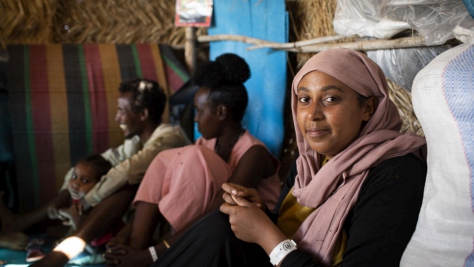UNHCR concerned over ending of rescue operation in the Mediterranean
This is a summary of what was said by UNHCR spokesperson William Spindler – to whom quoted text may be attributed – at today's press briefing at the Palais des Nations in Geneva.
UNHCR is concerned over the announcement of the ending this month of the Italian operation Mare Nostrum without a similar European search and rescue operation to replace it. This will undoubtedly increase the risk for those trying to find safety in Europe, and could lead to more refugees and migrants perishing at sea. It is estimated that 3343 people have lost their lives this year while making such journeys, 2755 of them since the start of July.
UNHCR has welcomed Mare Nostrum, which has contributed to the rescue of around 150,000 refuges and migrants since it began a year ago as a response to two tragedies off the coast of Lampedusa, where over 600 refugees and migrants died. Today, UNHCR reiterates its call for Europe to commit more resources to rescue at sea in the Mediterranean.
It is critical that the long-established tradition of rescue at sea is upheld by all. UNHCR also recognizes the efforts made by many commercial vessels - this year alone they have contributed to the rescue of about 37,000 people. To the extent possible, such rescue must ensure minimal financial impact on the shipping industry. Predictability on places for the disembarkation in safety of those rescued is also required.
In addition, Europe needs to step up efforts to provide credible legal alternatives to dangerous voyages to protect people from the risks of traveling with smugglers. The collective response needs to maintain a strong capacity to rescue people at sea and increase safer ways for refugees to find safety in Europe, including enhanced resettlement, other forms of humanitarian admission and private sponsorship schemes. UNHCR is also calling on European governments to do more to facilitate family reunification and use programmes such as student or employment visas to benefit refugees.
The level of desperation among many of those involved, fleeing war, persecution and violence, including from Syria require our concerted efforts to respond. This trend began in June and July last year, before Mare Nostrum was established, and has continued in 2014. In addition, an increased number of women, children, including many unaccompanied, and elderly people are taking to dangerous sea routes. They face greater risks, are more vulnerable to abuse and have specific needs that require assistance after they are rescued.
These challenges cannot be addressed by a few states alone; a joint European response is needed, based on collaboration among states and EU support. These efforts also need to ensure additional initial reception facilities, adequate reception conditions, assistance in processing as well as identifying solutions for those in need of international protection
For more information on this topic, please contact:
- In Rome, In Rome, Carlotta Sami on mobile +39 335 679 4746
- In Rome, Federico Fossi on mobile +31 349 0843461
- In Geneva, William Spindler on mobile +41 79 217 3011
Related news and stories
First UNITY Cup shows the power of football to connect refugees and hosts
Scholarships in Italy allow refugees to dream again
Relief for asylum seekers offered a new life outside Libya
Evacuation flights from Libya to Italy bring hope for vulnerable asylum seekers
UNHCR and Council of Europe discuss statelessness, urge States to uphold the right to a nationality in Europe
UNHCR warns of mounting refugee and migrant deaths in the Central Mediterranean
-

15by30 Roadmap - Coming together to achieve 15% enrolment by 2030 (visualized PDF)
23 Mar 2021 This PDF provides a visual summary of the 15by30 roadmap. It highlights where the strategy stems from, what the overall targets are and which actions need to be taken to achieve the goal to increase enrolment in higher education of young refugee women and men to 15% by 2030. -

Tertiary Education 15by30 roadmap - actions across the pathway (visualized PDF)
23 Mar 2021 Five key pathways facilitate access to higher education: national universities, the DAFI scholarship programme, technical and vocational education and training, connected higher education and complementary education pathways for admission to third countries. This PDF visualizes the key actions across each of these pathways – from strengthening partnerships to improving accessibility. -

Tertiary Education 15by30 Roadmap Agenda - Working Across the Five Pathways of Higher Education (visualized PDF)
23 Mar 2021 This PDF visualizes the different working steps that are part of the 15by30 roadmap agenda for higher education. -

UNHCR outraged by deadly attack against displaced population in Western Niger
23 Mar 2021 -

Uprooted in their own land: the internal displacement crisis
23 Mar 2021 With 45.9 million people displaced inside their own countries, a new data visualization reveals the scale of the issue, the latest trends and prospects for lasting solutions. -
Remarks to the 80th Session of the Standing Committee of the Executive Committee of the High Commissioner's Programme
23 Mar 2021 -

Bangladeshi authorities, aid agencies and refugee volunteers rush to respond as massive fire leaves some 45,000 Rohingya refugees without shelter
23 Mar 2021 -

Bain & Company
Bain & Company provides invaluable pro bono support to UNHCR on a range of strategic and organizational topics. It has advised UNHCR on the design and set-up of change management and business transformation capabilities. -

Better access to water improves lives for refugees and their hosts in Zimbabwe camp
22 Mar 2021 UNHCR, the UN Refugee Agency, and partners have improved water supply at Tongogara camp, in a project funded by the African Development Bank.
